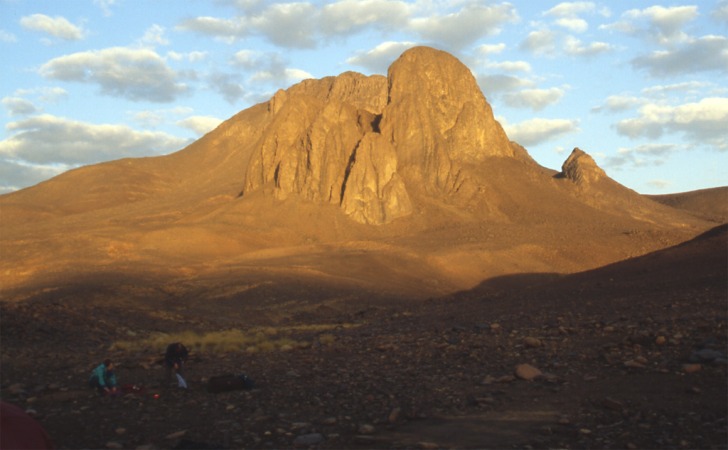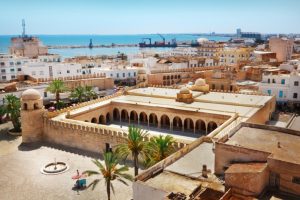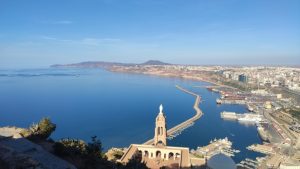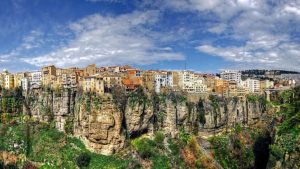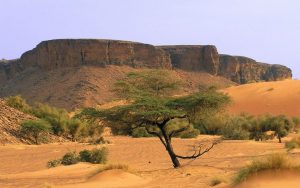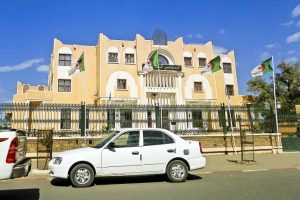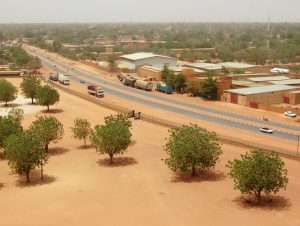 Algeria : Safety by City
Algeria : Safety by City
Algeria - safety as a country
Atakor, Algeria is a paradise for nature lovers and climbers.
It offers you a unique view of the Sahara, with snowcapped mountains instead of desert dunes.
Before you plan your trip, however, you should know if it’s a safe destination.
Algeria has gotten a bad reputation due to terrorist attacks, but the truth is much more nuanced.
Warnings & Dangers in Atakor

OVERALL RISK: MEDIUM
Atakor, Algeria has a low risk of terrorism, which is prevalent in some areas of the country. The biggest risk in Akator is nature, rather than people. The people here are conservative Muslims, but they are also friendly and welcoming of tourists. The Sahara can be harsh and unforgiving, but there are things you can do to stay safe in this region.

TRANSPORT & TAXIS RISK: MEDIUM
There are some concerns with transportation in Algeria. There's a very high accident rate here for a few reasons. The roads are overcrowded and not well maintained in some areas. Drivers can be erratic and don't always follow the rules of the road. In recent years, older buses have been retired, which has made traveling by bus a bit safer. However, there are still some older buses in poor condition on the road. Planes are considered safe, but it's an expensive transportation choice. However, it does save a lot of time and provides a comfortable journey. To get to Atakor, you'll need to travel to Tamanrasset. The best option from Tamanrassett is to hire a tour guide, which will provide you with safe transportation to Atakor.

PICKPOCKETS RISK: LOW
The risk of pickpocketing in Atakor is low. However, you will have more risk if you are in a city like Tamanrasset. Even in the cities, the risk of pickpocketing is less than that of many Western cities. You can reduce your risk of pickpocketing by not wearing expensive jewelry, wearing a cross-body bag, and not leaving your belongings unattended.

NATURAL DISASTERS RISK: MEDIUM
Flooding is very rare in Akator, although it is a concern in other areas of Algeria. The biggest risk in Akator is the extreme temperatures. In the summer, the temperatures can reach dangerous levels. In the winter, temps can drop below freezing, and snowfall can occur. Akator is a volcano, but the risk of an eruption is considered low. There's a small risk of earthquakes, which have occurred in the general area in the past.

MUGGING RISK: LOW
The risk of mugging in Akator is low. Overall crime in Algeria is average when compared to worldwide crime rates. Most crimes are petty crimes, like pickpocketing and theft. While muggings do occur, it's rare here. There's a slightly bigger risk if you are in Tamarrasset, but the risk is still fairly low.

TERRORISM RISK: HIGH
The risk of terrorism in Akator is considered high. However, this doesn't mean that you are likely to be the victim of a terrorist attack in the area. Terrorist attacks in or around Akator are rare. However, the risk is high compared to other countries, and other areas of Algeria. Terrorist groups typically operate near the borders with Tunisia, Libya, Niger, Mali, and Mauritania. Because the Sahara is so remote, terrorists also operate in the desert. To stay safe in Akator, it's best to work with a local guide. They can help you avoid any potentially dangerous areas that may have terrorists.

SCAMS RISK: LOW
The risk of scams in Akator is low because it's a remote area with a small population. Scams do occur in other areas of Algeria, particularly digital scams and identity theft. Be cautious when in Algeria, and avoid giving anyone your personal information unnecessarily.

WOMEN TRAVELERS RISK: MEDIUM
Algeria is a Muslim country. Catcalling is common here. In the West, this is seen as disrespectful. However, Algerian men see it as a compliment, rather than as a rude act. Women should travel with a guide or a group of people to reduce their risk of harassment and catcalling. If you are with a man, you'll be treated with respect. If you are alone, you can expect lots of catcalling and open stares. It can be easy to feel fearful in this situation, but the risk beyond catcalling or sexual harassment is very low. Men are extremely unlikely to act physically. They may ask you for a kiss, for example, but they will not attempt to "steal" one.

TAP WATER RISK: HIGH
When you are Atakor, or Algeria in general, you should only drink bottled or purified water. Never drink tap water, especially in rural areas like Akator. You should also avoid eating raw fruits and vegetables, unless they are peeled. Do not order drinks with ice unless the water has been purified. You are unlikely to get seriously ill from the tap water in Atakor, but you can experience mild stomach upset. This can cause diarrhea, which can ruin your trip. Depending on the sterilization procedures, there is a potential of getting very ill.
Safest Places to Visit in Atakor
The most important place to visit in Atakor is the Ahaggar National Park.
The park covers a massive 450,000 square kilometers within the Saharan region.
The city of Tamanrasset is nearby and is the closest populated area.
The Ahaggar Mountains make up most of the park.
The highest peak is Mount Tahat, which is 3,003 meters above sea level.
Ahaggar National Park covers an area of approximately 450,000 square kilometers in the Saharan Algeria Region in the extreme south of the country.
The closest populated area near the park, which lies in a desert mountainous zone, is the oasis city of Tamanrasset.
The Ahaggar Mountains, also known as the Hoggar, dominate the park, with the highest peak being Mount Tahat, measuring 3,003 meters above sea level.
You should also visit the Tin Hinan Tomb.
It was built for Queen Tin Hinan in the 3rd or 4th century.
Her name means “woman of the tents”.
However, it’s often translated to mean “queen of the camp”, and more loosely, to “mother of us all”.
Places to Avoid in Atakor
There aren’t any particular places to avoid in Akator.
However, you shouldn’t explore the area alone.
The desert itself is dangerous, so you should always have a guide when you are exploring here.
Safety Tips for Traveling to Atakor
- Travel with a Guide. This is essential when visiting Atakor. You should ideally arrange for a guide before your trip. If you don’t have a guide ahead of time, you can hire one in Tamarrasset. Traveling in the Sahara without a guide is very dangerous. Guides understand the area and know how to stay safe. This includes bringing the proper supplies, navigation, and avoiding potential terrorists and criminals.
- Learn French. Arabic is the first language spoken in Algeria, but most people speak French as well. French is relatively easy to learn for English speakers. You don’t need to be fluent in French, but it’s a good idea to learn some basic phrases. This makes it much easier to communicate when in Atakor. It will also show that you are willing to put in effort to respect the locals and their culture.
- Dress Properly. You’ll encounter a very strong sun in the Sahara. You’ll need long-sleeved clothing and a hat. Sunglasses are also recommended. You should also understand the weather before you go. Will it be extremely hot or cold? Be sure to pack appropriately for the weather there.
- Bring Supplies. Be sure to bring supplies when heading to the Sahara. Your guide should be able to provide a list of the things you’ll need. Generally, you’ll need food, plenty of water, and a first aid kit. You’ll need a gallon of water per person a day at a minimum. If you need any medication, you should bring them. Remember, once you leave Tamanrassest, there are few opportunities to get supplies.
- Bring Technology. It’s best to bring a GPS and a satellite phone. You won’t have cell coverage in this area. If you have an emergency, a satellite phone can be a literal lifesaver. Tour guides are experienced at navigating the desert, but a GPS is a good back up plan.
- Get Vaccinated. The CDC recommends a few vaccinations in addition to the standard U.S. vaccines before traveling to Algeria. You may need to get Hepatitis A, Hepatitis B, Rabies, Tetanus, and Typhoid vaccines. Polio outbreaks occur in Algeria, so you should also consider polio vaccination.
- Respect the Culture. Algeria is a Muslim country. Women should dress conservatively, and avoid shorts and short skirts. Long sleeves are recommended as well. You should consider wearing a head cover while in Algeria. This isn’t required, but it will make you less conspicuous. You should also avoid any displays of affection while in public. If you are a same sex couple, do not show any signs of this in public. If you are a heterosexual couple, you should still avoid any contact with each other in public.
- Be Aware of Wildlife Dangers. The heat of the Sahara is by far the most dangerous thing in Atakor. However, there are some deadly animals you should keep an eye out for. The deathstalker scorpion is the most venomous scorpion in the world. Its sting isn’t usually fatal for healthy adults. However, it can be deadly if you are elderly, a child, or have a major health condition. The sting is excruciatingly painful. The sand viper is another dangerous desert dweller. It hides in the sand and ambushes its prey. They are very hard to spot, so you should keep an eye out when traveling in the desert. They are rarely fatal for healthy adults, but they do deliver a nasty bite that can cause pain, tissue death, and bleeding.
- Stay Aware of Your Surroundings. This is important anytime you are traveling. Be sure to keep an eye on your surroundings. You should always trust your gut feeling as well. If something feels off, it probably is.
- Enroll in STEP. STEP stands for Smart Traveller Enrollment Program. It’s a free service offered by the U.S. government. You’ll be connected to the nearest U.S. Embassy or Consulate. This makes it easier to contact you in an emergency. You’ll also receive alerts about weather or security threats.
So... How Safe Is Atakor Really?
Atakor, Algeria, is relatively safe.
While there is a higher than average terrorism risk, the odds of an attack occurring during a visit are very low.
Remember, the biggest danger here is the Sahara, rather than the people that live in the area.
How Does Atakor Compare?
| City | Safety Index |
|---|---|
| Atakor | 52 |
| Oran | 31 |
| Annaba | 44 |
| Ghardaia | 48 |
| Tamanrasset | 30 |
| Algiers | 50 |
| Deadwood (United States) | 80 |
| Sturgis (United States) | 80 |
| Pierre (United States) | 81 |
| Spearfish (United States) | 80 |
| Hill City (United States) | 83 |
| Temuco (Chile) | 31 |
Useful Information

Visas
A visa is required before entering Algeria. Unless you are arriving by cruise ship, you must have a visa before arriving in Algeria. A visa is valid for 6 months.

Currency
The Algerian Dinar is the currency here. Some places will take the British Pound, but few places accept travelers' checks, credit cards, or American dollars. Currency exchange can only be done at banks, so you should exchange currency in Tamarrasset. You can't leave Algeria with Dinars, so keep this in mind when exchanging currency.

Weather
Atakor has a hot desert climate. Rainfall is sparse. Temperatures are moderate in the evenings and night due to the high elevation, so be prepared for hot days and cool nights in the summer. In the winter, temperatures are usually moderate, but it can reach below freezing. Snow can fall in higher elevations.

Airports
You'll want to fly into Algiers. Then, you can take a flight to Tamarrassat. Hadj Bey Akhamok Airport serves Tamarassat and the surrounding area.

Travel Insurance
You should have travel insurance before heading out. This can cover mishaps like canceled flights and lost luggage. You should choose a policy that also includes health coverage in case of an emergency.
Atakor Weather Averages (Temperatures)
Average High/Low Temperature
| Temperature / Month | Jan | Feb | Mar | Apr | May | Jun | Jul | Aug | Sep | Oct | Nov | Dec |
|---|---|---|---|---|---|---|---|---|---|---|---|---|
| High °C |
13 | 14 | 17 | 21 | 24 | 26 | 26 | 25 | 24 | 20 | 16 | 14 |
| Low °C |
4 | 6 | 8 | 12 | 16 | 18 | 18 | 16 | 16 | 12 | 9 | 5 |
| High °F |
55 | 57 | 63 | 70 | 75 | 79 | 79 | 77 | 75 | 68 | 61 | 57 |
| Low °F |
39 | 43 | 46 | 54 | 61 | 64 | 64 | 61 | 61 | 54 | 48 | 41 |
Algeria - Safety by City
| City | Safety Index |
|---|---|
| Algiers | 50 |
| Annaba | 44 |
| Atakor | 52 |
| Ghardaia | 48 |
| Oran | 31 |
| Tamanrasset | 30 |
